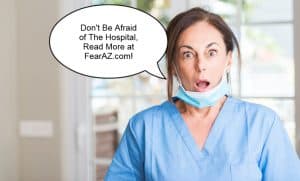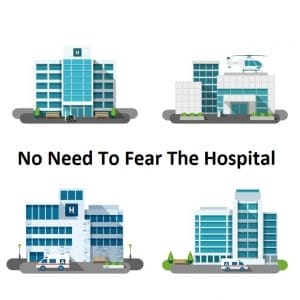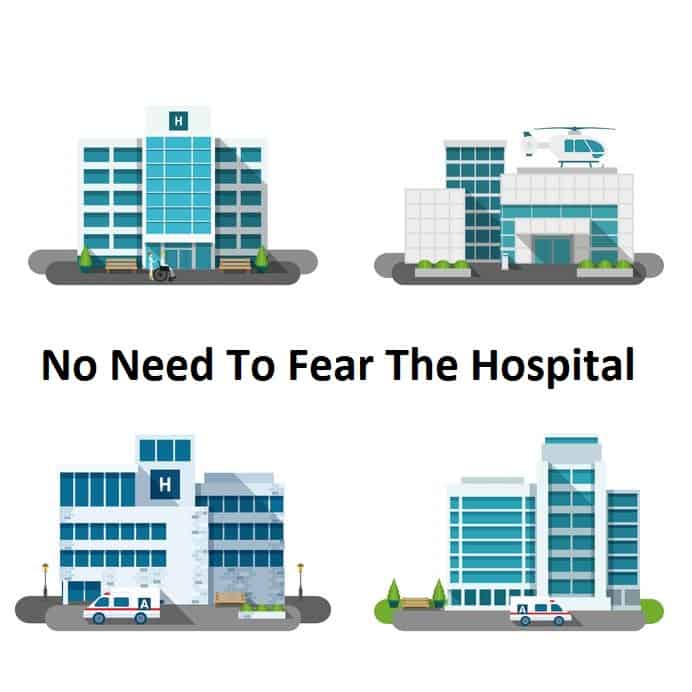Share This Article
The Fear of Hospitals Is Not Just a Cliche
Turn on the TV at any given time, in any city, and you are bound to run across a slew of medical shows.
House., ER, General Hospital, Scrubs, Doc Martin—from soap operas to comedies to dramas to dramedies, medical shows are everywhere, and with them, all manner of beeping machines, scary diagnoses, and patients being saved, or not. . .
With all those sick patients living and dying like the one at the start of the movie Up (it’s OK, cry, we all do) from a certain point of view, it could be seen as totally understandable that we don’t like hospitals. But what if that dislike goes beyond that into outright fear?
No one actually likes hospitals (it’s not like they’re on anyone’s bucket list of vacation destinations) but they’re a critical part of our communities.

If you are sick, hurt, have a disease, or suspect you or someone you love might have one, especially in the era of Covid-19, you should be able to go to the hospital without fear.
That’s why it is so important to get to what’s at the root of the fear of hospitals, why some people move from dislike to outright terror, and if that’s you, what you can do about it.
Defining and Diagnosing this Phobia
First things first: What is the name for fear of hospitals? To put a label on things is the first step to conquering them, so it’s worth noting that the proper name for a fear of hospitals is nosocomephobia.
To break the term down, nosos is Greek for “diseases” while comes is Latin for “consequences” or, oddly enough, “companion.”
Aside from the interesting fact that this is the rare phobia that mixes both Greek and Latin terms rather than use one or the other, these terms taken together point to the fact that being phobic of hospitals is really a fear of “diseases” and the “consequences” thereof.
This actually brings us to a related question: What is the fear of doctors called? Because many people who suffer from a phobia of hospitals also suffer from a fear of doctors and possibly even needles. The fear of doctors is referred to as iatrophobia, while trypanophobia is the fear of needles.
Both of these, as well as a litany of other phobias about diseases, germs, and death all contribute to the overall nature of nosocomephobia.
Causes and Symptoms of Nosocomephobia
But let’s return to nosocomephobia itself, because there are still more reasons why sufferers feel phobic at the sight of hospitals. One important thing to note here is that it’s perfectly understandable to feel uncomfortable in a hospital. After all, a lot of uncomfortable or even tragic things can take place here (again, that hospital scene from Up).
That’s why it’s so important to be able to distinguish between this normal dislike of hospitals and an outright phobia.
The causes here should be apparent. We have already touched on many of them. If you have had a family member who has suffered or, God forbid, perished in a hospital, chances are you won’t think too fondly of the place. This, over time, can compound upon itself and become a fear of the place itself, especially if you are younger, when traumatic incidents can loom larger and make greater, deeper impressions upon your psyche.
Those medical shows may not help, either. The phrase “Monkey See, Monkey Do” exists for a reason—we are highly impressionable, especially when we see fellow humans engaging in or suffering from a certain activity.
On the one hand, there are limits to this. While anti-violent video game crusaders have made a career out of this argument, research has shown time and again that first-person shooters and other violent video games are not directly linked to violence. Likewise, watching Dr. House won’t suddenly transform you into a snarky pill-popping, cane-pimping medical savant yourself.
But it may exacerbate your fears of medical conditions and associated issues such as germs if you already have them. In this way, it’s more like “Monkey See, Monkey Feel,” as we empathize with and thus even share the phobias perpetuated (though unintentionally) by the media we consume. Watching characters get sick obviously won’t make you sick, but if you have germaphobia, it could enhance paranoid feelings that every surface is covered with deathly microbial invaders which can kill at a touch.

This is obviously an irrational belief, which is the essential point about phobias. They are, by definition, irrational. That doesn’t make your feelings illegitimate, but it is important to distinguish between an irrational fear (even looking at a hospital may give me a panic attack, and going in may kill me) and a rational one (hospitals are places where, yes, there are plenty of sick and sometimes dead people).
In addition to identifying all of these causal signs, you’ll also want to look for these common symptoms of nosocomephobia:
- Obsession over hospitals
- Panic attacks when looking at or even thinking about hospitals
- Nausea
- Elevated heart rate
- Sweating
- Shortness of breath
- Anxiety
- Exhibiting extreme avoidance behavior (i.e., refusing to go to the hospital even if you have a serious medical condition)
Treatment Options for Nosocomephobia
Needless to say, after that preamble about medical TV shows heightening already existent paranoias, if you suffer from a phobia of hospitals, doctors, needles, germs, disease, or any number of other conditions associated with these, an ER marathon probably isn’t a good idea.
Beyond that, conquering something like nosocomephobia is largely down to you and your own efforts. Given the fact that you have a fear of hospitals and doctors, you aren’t likely to be quick to seek out “professional medical help” anyway.
Change the Way Your Fear of Hospitals Phobia Affects You
For starters, you might try practicing mindfulness techniques to focus your mind when thinking about hospitals. This can help you focus your thoughts away from the irrational fears which can pervade your psyche when confronted with hospitals and allow you to consider them in a more rational manner. If you’re naturally a more rationally-minded, logic-and-problem-solving type of person, this approach may be best for you.
Meditation is another useful way to combat anxiety, nosocomephobia included. This can help you stop thinking and fixating on your phobia so much and instead clear your mind and achieve the peace you need to proceed with your life. Deep breathing exercises can also be a useful way to calm yourself, and can be achieved on the go if you do have to enter a hospital as well.
Then there is hypnosis. While the results can vary and data remains ambiguous, if you have benefited from hypnosis treatments for other phobias before, hypnosis treatments for nosocomephobia could be a big help.
There is no denying that a hospital can be a scary place, and cases there often don’t have a “Hollywood ending.” Nevertheless, they save countless lives, and are a huge benefit to not just our society but humanity at large. Hospitals are a force for good, and hopefully you can overcome your phobia and see and feel that good for yourself.



